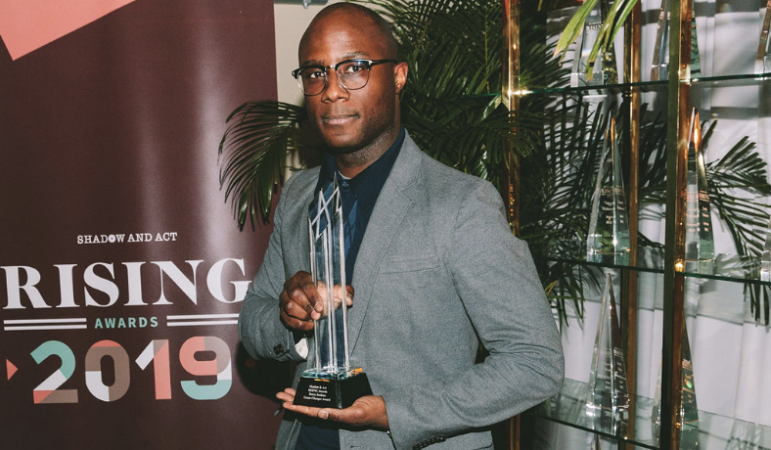Black Hollywood was out in full force on February 22 for Shadow And Act’s first annual RISING Awards brunch, celebrating 32 emerging stars throughout the industry (find the full list of honored actors, executives, creators and behind-the-scenes stars here). If Beale Street Could Talk, Moonlight and Medicine For Melancholy writer and director Barry Jenkins received Shadow And Act’s 2019 Game-Changer Award for consistently depicting the revolutionary depth of Black love on screen.
From his first feature film, Medicine for Melancholy, where he captured the complexity of being Black and loving Black in a gentrifying San Francisco; to his Oscar-winning follow-up Moonlight, which examined Black masculinity and queer Black male love as we’ve never seen it before on screen, to his James Baldwin adaptation, If Beale Street Could Talk, his choreopoem on the transcending power of Black love, this writer and director has wielded his camera in defense of Blackness, in the name of Blackness, for the love of Blackness. Jenkins accepted his award and keynoted the event with an epic speech on the magic Black creators make when we have access to resources. Watch the speech below:
Here’s the full transcript of his speech:
“I want to thank Blavity for picking up Shadow and Act. And I feel like meeting Tambay [Obensen, The Founder of S&A] all those years ago. The dream they had for that website, for that entity…is in this room right now. It’s in this room. It’s at the Oscars. It’s at the Essence Fest. It’s all over the place right now. The dream those men had has now been fulfilled by you, my dear. By Blavity. And by everybody in this room. So, round of applause for everybody please?
“And when I first heard of Shadow and Act, I didn’t know what the hell it meant. I was like, ‘What the hell is Shadow and Act?’ And so then, I finally looked it up, and I wanted to read this quote from Ralph Ellison, who described it as exemplary of his ‘attempt to transform some of the themes, the problems, the enigmas, the contradictions of character and culture native to this predicament into what Andre Malraux has described as conscious thought.’ I look around this room and I see so much conscious thought manifested in your performances, in your writing, in your directing, in your music, in your ringtones…all that shit. Because the rhythm of that, the rhythm of that, no doubt has something to do with Blackness. It all comes back to culture. I think what Shadow and Act does, is to take that culture and promote and present it to ourselves and then the culture at large.
“And I want to finish this by talking about Jazz. I want to talk about Jazz a little bit. So when Medicine happened, I went on a world tour with the film. And I went to Argentina, of all places, for a festival called the Mar del Plata Film Festival. So, I’m sitting around these Argentines and they just talking so much shit about America. Because, Barack Obama had been elected. I made my first film, literally the morning after Barack Obama was elected. Medicine for Melancholy was opening in San Francisco, I believe. And then of course, Moonlight came out and Donald Trump was elected. Name redacted, I should have said. To hell with him! I went to Argentina and they were basically trying to check me. Like, ‘Yeah America is great, but what has it done?’ They were like, ‘Nothing in the world, no art form in the world has come from America.’ We went through the list, we tried to figure this shit out. A sculpture, a painting, photography all originated elsewhere. And then he said, ‘Oh, but except Jazz.’ They were like, ‘Jazz is the only thing that America’s truly created, really just out of the ether. Didn’t exist before America.
“And I said, ‘Well, why is that?’ And we started to unpack that. He’s like, ‘Well, the instruments were there.’ Yes they were. ‘Music was being played.’ Yes it was. But the instruments were not in the hands of Black people. And once it got in the hands of Black folks, this whole new art form just came out, just came out of nowhere. Out of thin air. And then from Jazz, Rock. We get Blues. We get Soul. We get all this damn…we get Gospel…just everything. The bedrock of American musical culture.
“Now, to the people in this room, you know what else is happening? All these damn cameras around the room, forever, we could not afford them. Film’s not made for us. Emulsion was sold to white families to go on vacations and take photos of their children. Cinema was a mistake. But that emulsion was calibrated to reflect white skin. Now, it was very expensive also. All these digital cameras, we can afford them all. But you know what’s happening? Now they’re in our hands. In the hands of all the people in this room. And you see a Black Panther. You see, hell, a Moonlight. You see a Get Out. You see a Middle of Nowhere. You see all these modes of expression. Because now, there are tools and instruments in music. Instruments of cameras, of imagery, they’re in our hands. What’s gonna happen? Gonna keep flipping it and flipping it and flipping it and flipping it and flip that to conscious thought.
“Thank you very much for this award. God bless ya’ll. Much love.”
READ MORE:
The Inaugural Shadow And Act RISING Awards Honored Black Hollywood’s Emerging Stars

